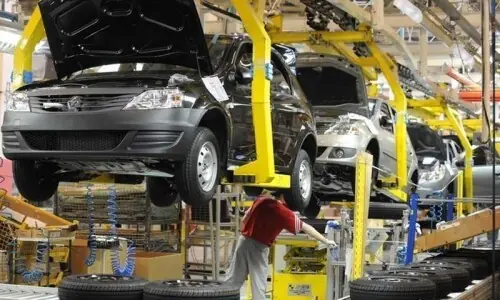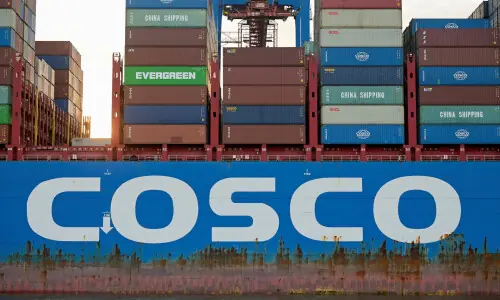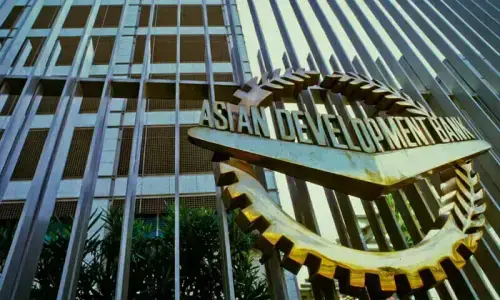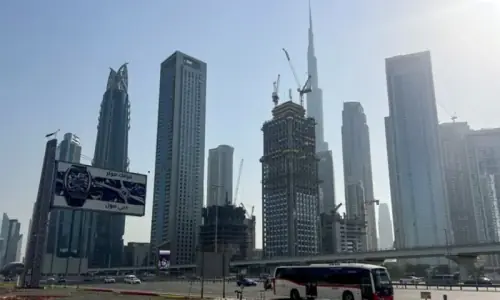A draft report, a pre-feasibility study (Pre-FS) on the potential for Energy Transition Mechanism (ETM) Opportunities in Pakistan, prepared by the Asian Development Bank (ADB) to guide Pakistan on the decarbonisation of its energy sector has drawn a lot of criticism from numerous local and international advocacy and community-based organisations working for the promotion of cleaner and sustainable energy sources.
The ADB’s ETM initiative aims to help willing countries reduce their carbon footprints through low-carbon investments and the deployment of clean energy technology. This way, they can strike the right balance between energy security, affordability and sustainability for the development of ecosystems that can sustain their economic development and alleviate poverty while spurring growth arising from the energy transition.
When contacted to get the ADB and consultant’s comments on the criticism against the report, its consultant Aman Ullah Mangrio said any query should be sent to the Ministry of Climate Change, which is the owner of the ETM project. “It’s not appropriate for me to respond. Suffice to say the project is still in its early stages,” he said by telephone.
In their comments on the report, organisations like the Alliance for Climate Justice and Clean Energy (ACJCE), the US-based Institute for Energy Economics and Financial Analysis (IEEFA) and Go Green, have more or less raised similar concerns over the ETM scheme report.
Concerns range from lack of transparency to selection of power plants for early retirement
Their concerns range from lack of transparency to selection of power plants for early retirement to retention of gas-based generation to the preference given to expensive hydropower over variable renewable energy, and so on.
The first concern pertains to the lack of transparency and openness, which is against the lender’s own policy of engaging with stakeholders and communities in an open and transparent manner.
The communities engaged constitute only those that have power plants and owner companies. The study neither includes nor considers the broader communities that are being impacted by the polluting power plants. There is no indication of carrying out an assessment for compensating the communities and areas that are adversely impacted due to the polluting assets, these groups argue.
These groups also highlight limitations to the ADB’s Just Transition criteria. The document says the communities directly related to assets through employment will be resettled to other sources of employment, including any possible replacement clean energy projects.
But the missing part is the prioritisation of those areas where these assets are situated to create the potential for employment in clean energy projects.
This can end up disqualifying areas where there is a concentration of fossil fuel projects and prioritising those areas where there is imagined potential for clean energy resources, like sites conducive for solar energy and wind energy generation.
Transmission bottlenecks cannot be ‘assumed to persist’ for 10-20 years — this is particularly important as the transmission will have a major impact on prospective investments, the type of investment and its location
“Thus, the areas where fossil fuel-based power generation is situated remain disadvantaged. And of course, there’s no guarantee that the operators and engineers from a coal power project would simply shift to work on a solar, wind, or other renewable energy project, let alone that it would provide viable job options for local communities.”
The clean energy groups have also expressed their surprise over the exclusion of gas-fired thermal power plants from the scheme’s scope. They say this was a big issue since Pakistan is facing the worst economic crisis of time, and the energy crisis is the main contributor.
“The major reason behind the energy crisis is the less reliance on local resources for fulfilling energy demands leading Pakistan to rely on imported energy sources with vulnerabilities attached.
“The recent trends in the energy mix of Pakistan and government policies is to diversify its energy mix by minimising the share of residual fuel oil power plants and increasing the share of gas-based power plants and coal-based power plants.
“However, recent geopolitical incidents like the Russia-Ukraine war have totally changed the dynamics of the global gas market in the last year. The long-term contracts of EU countries with Qatari companies for ensuring the supply of LNG and less bargaining power of low and middle-income countries like Pakistan to ensure the required supply is a case in point.
“The natural gas resources from Pakistan are shrinking and the cost of importing LNG is constantly putting a huge drain on foreign exchange reserves and the overall fiscal space available. Thus, the inclusion of indigenous natural gas-fired power plants and imported LNG-based power plants is justified considering the criteria like the security of supply and financial viability of the power plant.
“Recently, the government plans to expedite the process of privatisation of two LNG power plants — 1320 MW each — that include Baloki power plant and Haveli Bahadur Shah power plant, as it is finding it difficult to finance their operations smoothly. In such a visible scenario, one wonders what criteria is causing the ADB to not consider gas-fired power plants under the ETM process.”
They believe that the ADB’s policy of considering gas as a transition fuel will not be the right remedy considering the climatic and economic vulnerabilities prevailing in Pakistan.
Gas-fired power plants have huge environmental costs in the form of air pollution like methane and other toxic sulfates. No wonder Pakistan has the most polluted metropolitan cities in the world.
Plus, the infrastructure required, like LNG terminals (FSRU) for increasing LNG import volume, poses serious environmental and ecological threats. “Therefore, we urge ADB to reconsider its decision not to incorporate gas-fired power plants in its Pre-FS studies for ETM Pakistan,” state the comments.
According to the IEEFA, the issue of the power sector’s circular debt is highly pressing as its value reaches an unsustainable level of Rs2.5 trillion.
“An ETM that targets the removal/repurposing of imported fuel-dependent assets can go a long way in lessening the burden of additional circular debt by reducing the accrual of both forex-dependent capacity payments and increasing fuel prices due to price volatility of imported fossil fuels.”
These groups call for focusing on transmission and grid modernisation as these constraints are responsible for almost one-third of the installed capacity not being available to the system.
Therefore, any recommendations for an energy transition mechanism should include prioritisation of investments in grid modernisation and de-bottlenecking to accommodate higher shares of variable renewable energy as well as increasing volumes of delivered power to consumers.
Transmission bottlenecks cannot be ‘assumed to persist’ for 10-20 years. This is particularly important as the transmission will have a major impact on prospective investments, the type of investment and its location.
Published in Dawn, The Business and Finance Weekly, April 25th, 2023





























